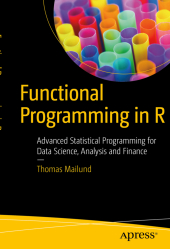 Neuerscheinungen 2017Stand: 2020-02-01 |
Schnellsuche
ISBN/Stichwort/Autor
|
Herderstraße 10
10625 Berlin
Tel.: 030 315 714 16
Fax 030 315 714 14
info@buchspektrum.de |

Thomas Mailund
Functional Programming in R
Advanced Statistical Programming for Data Science, Analysis and Finance
1st ed. 2017. xv, 104 S. 6 SW-Abb., 1 Farbabb. 235 mm
Verlag/Jahr: SPRINGER, BERLIN; APRESS 2017
ISBN: 1-484-22745-X (148422745X)
Neue ISBN: 978-1-484-22745-9 (9781484227459)
Preis und Lieferzeit: Bitte klicken
Master functions and discover how to write functional programs in R. In this concise book, youŽll make your functions pure by avoiding side-effects; youŽll write functions that manipulate other functions, and youŽll construct complex functions using simpler functions as building blocks.
In Functional Programming in R , youŽll see how we can replace loops, which can have side-effects, with recursive functions that can more easily avoid them. In addition, the book covers why you shouldnŽt use recursion when loops are more efficient and how you can get the best of both worlds.
Functional programming is a style of programming, like object-oriented programming, but one that focuses on data transformations and calculations rather than objects and state. Where in object-oriented programming you model your programs by describing which states an object can be in and how methods will reveal or modify that state, in functional programming you model programs by describing how functions translate input data to output data. Functions themselves are considered to be data you can manipulate and much of the strength of functional programming comes from manipulating functions; that is, building more complex functions by combining simpler functions.
What YouŽll Learn
Write functions in R including infix operators and replacement functions
Create higher order functions
Pass functions to other functions and start using functions as data you can manipulate
Use Filer, Map and Reduce functions to express the intent behind code clearly and safely
Build new functions from existing functions without necessarily writing any new functions, using point-free programming
Create functions that carry data along with them
Who This Book Is For
Those with at least some experience with programming in R.
1. Functions in R 2. Pure Functional Programming 3. Scope and Closures 4. Higher-order Functions 5. Filer, Map, and Reduce 6. Point-free Programming Afterword
"The book is written in an exhaustive, text-book-like manner with theoretical paragraphs accompanied by lots of examples presented from various angles. The book is intended for readers with a fairly good command of R who wish to extend their programming skills towards a functional approach on data handling. ... it is a great addition to a programming library for mathematicians, computer scientists and applied life scientists alike." (Irina Ioana Mohorianu, zbMATH 1376.68002, 2018)
Thomas Mailund is an associate professor in bioinformatics at Aarhus University, Denmark. He has a background in math and computer science. For the last decade, his main focus has been on genetics and evolutionary studies, particularly comparative genomics, speciation, and gene flow between emerging species. He has published Beginning Data Science in R with Apress as well as other books out there.


